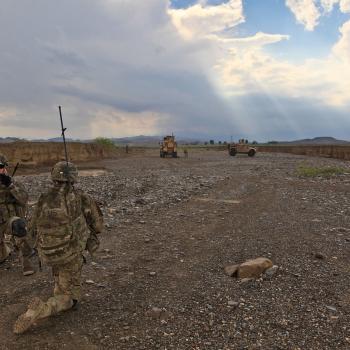
Monday: Read Matt 24-25
Today’s reading presents us with Jesus’ fifth sermon (Note 26:1 clearly marks the end of Jesus’ speech). Since I have written much about this sermon,[2] and since it corresponds to Mark 13, which we have already discussed in our Mark devotional, and since today’s reading is longer, I will keep the remarks here brief.[3]
The 5 sermons in Matthew are quite likely another example of Matthew’s effort to portray Jesus as the new Moses.
- Sermon on the Mount: the Law for the new KOG (5-7)
- Commissioning of the disciples (10)
- Seven Parables on the Kingdom (13)
- Living as the community in the Kingdom (18)
- Olivet Discourse: looking ahead and warning of what is to come (24 [23?]-25)
Taken together these sermons portray Jesus as leading them through the desert and the defeat of death itself and preparing them for the new world to come; only unlike Moses, Jesus will go with them into the new land (like Joshua—namesake).
Questions to ponder/discuss:
- We all want to know the details as to what will happen next likely so we can have a measure of control. Christ says to us that He is Lord—meaning He is in control—and our job is to be faithful today: which Jesus defines as “be on the alert” (24:42). The parables of Matt 24:45-25:46 stress the need for us to be prepared. What do you think being prepared means? Note: be careful about answering this only in terms of yourself. What are you doing to be prepared?
Tuesday: Read Matt 26:1-46
Matthew 26 narrates the events of the last few days of Jesus prior to His arrest and crucifixion. Matthew portrays the leadership as responsible for Jesus’ arrest (3-4). The decision is to wait until after the festival (Note: the Feast of Passover and the Feast of Unleavened Bread last a total of 8 days).
The anointing of Jesus (7) by a woman not named is immediately contrasted by “one of the twelve named Judas” (14). Judas’ act of betrayal is then contrasted by Jesus’ acts of love and friendship (26-29). Jesus’ acts of love and friendship is then contrasted by Peter’s desire to be faithful but his inability to do so (31-35).
Jesus’ prayer in Gethsemane demonstrates Jesus’ humanity and His willingness to follow the Father’s will (36-46).
Questions to ponder/discuss:
- Too often we live as though there is no urgency to our Christian life. We noted on Monday’s reading that the command for us is to be faithful. But then we let things go and neglect the need to be truly transformed (of course, kudos to you for your diligence in this study). Then, suddenly, the day comes when our faith is challenged, or when we are needed to be Christ for someone else, and we are not prepared. Jesus’ life of prayer and steadfast devotion prepared Him for Gethsemane. Will you be ready if called to lay down your life? Only by relying daily on the Holy Spirit can we be prepared.
Wednesday: Read Matt 26:47-27:10
Matthew stresses that Jesus was betrayed by “Judas, one of the twelve” (47). We already knew that Judas is one of the twelve. Matthew told us in 26:14. Matthew’s repetition of this in 26:47 confirms his stress on the fact that Jesus was betrayed by one of his own. Then, when Judas arrives, he identifies Jesus with a kiss (48)—an act of friendship (1 Thess 5:26). Even more striking is the fact that when Judas arrives, Jesus calls him “friend” (50).
Though the authorities appear in the story as convinced of the need to have Jesus charged and killed, they were still attempting to follow the law. Their plans to wait until after the festival had taken a strange turn and now they are pressed to get this done before the Sabbath. Since the “trials” were taking place late on Thursday night they have little time to get a conviction and then carry out the punishment before nightfall on Friday when the Sabbath begins.
The gospels are clear that the primary charge against Jesus was His claim regarding the temple (61; 27:40). The temple was the center of civic and religious life as well as the center of Jewish identity. Matthew claims that “two” witnesses agree that Jesus claimed that He was able to destroy the temple (61). The problem for them is that there is nothing punishable by law about such a claim. Finally, the High Priest implores Jesus as to whether He is the Christ (63). Jesus affirms (64).
Discussions on the suffering of Jesus during the crucifixion often neglect the abuse that took place during the night of His trials. They beat Jesus and demand that he “prophesy” (67). Matthew then follows this account with Peter’s denials and the fulfillment of Jesus’ prophecy concerning him (34)!
The difference between Judas’ betrayal and Peter’s denial is manifested in their responses. Peter, “wept bitterly” (75). Judas, who felt remorse (3), went and hanged himself (5).[4]
Questions to ponder/discuss:
- It is important again that we remember to read the text not as some outside observer looking in. When we do this we too often read as though we are on “team Jesus” and, thus, Judas and those in power are our opponents too. Instead, we should identify with those who are responsible for the death of Jesus. Why are they so opposed to Jesus? If you were there, why might you have been so opposed to Jesus?
Thursday: Read Matt 27:11-56
There is every reason to suggest that Pilate did not want to have Jesus crucified—note 23: “why, what evil has He done?” The offer to release Barabbas or Jesus is also an indication. Surely, Pilate may well have thought, they would prefer that he release Jesus.
NB: some manuscripts indicate that Barabbas’ name was “Jesus” (see NET Bible). The name “Barabbas” (lit. ‘son of a father’) is likely a nickname at best given to him by the early church. If so, then the offer is which Jesus would you like to be released, “Jesus, a son of a father”? or “Jesus, the Son of the Father”?
Pilate’s washing of his hands does not absolve him of guilt. He was the Roman official in charge and the one who “delivered Him to be crucified” (26).
The suffering of Jesus continues in the Praetorium. He is given a crown of thorns, a scepter for this right hand, and he is then mocked and spat upon (28-30). For Matthew and all the gospel writers, the irony runs deep. They are mocking Him for claiming to be a king, when, in fact, He is the True King. There is no question that the gospel writers believe that the cross is the moment when God became king!
Questions to ponder/discuss:
- A prominent theme in the NT is that Jesus is the King and that He has made His followers to rule as well. But if Jesus has become the King through the cross, then what does that mean for us? Compare Mark 8:34.
- If Jesus suffers that others might live, then should we not also be willing to suffer that others might live?
Friday Read Matt 27:57-28:20
Matthew has been quite intentional with regard to Galilee. His resurrection account highlights the role of Galilee (7, 10). He notes that Jesus told the disciples that when He was raised He would go ahead of them into Galilee (26:32). Matthew notes that the women were from Galilee (27:55). Earlier he noted that Jesus began His ministry in Galilee (4:12, 15). And that all of this is to “fulfill” the prophecy in Isa 9:1 “Galilee of the Gentiles” (see Matt 4:15).
That the final scene (the Great Commission) takes place on a mountain in Galilee (16-20) parallels Moses on Mount Nebo (Deut 34:1-4). As Moses looked into the promised land, so Jesus commissions His disciples to “go” (19).
In Psalm 2, the nations are given to the “son” as an inheritance. Here Jesus gives His disciples a message for the nations.
The Great Commission has all the earmarks of a covenant. It opens with an introduction of Jesus as the Great King: “All authority has been given to Me in heaven and on earth (18). This is followed by a set of demands: “Go therefore and make disciples of all the nations, baptizing them in the name of the Father and the Son and the Holy Spirit, teaching them to observe all that I commanded you (19-20). And the commission closes like a covenant with a promise of blessing: “and lo, I am with you always, even to the end of the age” (20).
This commissioning affirms that Jesus is the King! Mission accomplished. NT Wright concludes, “Despite what many people today suppose, it is basic to the most elementary NT faith that Jesus is already ruling the whole world. That is one of the most important results of his resurrection” (Wright, Matthew for Everyone, 206).
Now, as the great King, Jesus issues a command to all his followers that echoes Gen 12:3, “Go and be a blessing.” The command contains one charge: “make disciples” (19). We should not understate the distinction between making disciples and making converts. Making converts entails a one-time act. Making disciples is a lifetime commitment.
The process of making disciples includes both “baptizing” and “teaching” (19-20).
Finally, we conclude our study of Matthew by recalling that Matthew 1:23 and 28:20 form an inclusio: Jesus is “Immanuel” (1:23) and now He is “with you always” (20). It is easy to read the gospels and realize that Jesus was “God with us,” but it is important to remember that He remains “with you always.”
Questions to ponder/discuss:
- The resurrection of Jesus is the central pillar of Christianity. His resurrection distinguishes Jesus from all other religious leaders.
- We should not look at the Great Commission simply in terms of preaching the Gospel. It entails a lifestyle that always manifests Christ. Thus, “By this all men will know that you are My disciples, if you have love for one another” (John 13:35). An excellent book is titled, “The Patient Ferment of the early Church.” The author contends that one of the primary reasons why Christianity grew in the first several centuries is because they practiced the virtue of “patience.” The author means by this that the Christians were different than everyone else and loved and created peace in the midst of adversity. Matthew challenges us to take the virtue of patient love and grace to everyone at all times.
[1] This guide is meant to be done either as a group study over the course of 2 or 4 meetings (Day 1-5; 6-10; 11-15; 16-20), or as a private devotion over the course of 4 weeks (or a calendar month—5 lessons per week).
[2] See Understanding the NT and the End Times, chapter 10; and These Brothers of Mine, chapter 16.
[3] If you have any questions, please send them to me!
[4] It is certainly inappropriate to make judgments about those who commit suicide based on Judas’ actions. There are many reasons, including mental illness, why people commit suicide.












